Financial Accounting and Reporting: Global System and Investor Use
VerifiedAdded on 2023/01/18
|11
|3093
|37
Report
AI Summary
This report delves into the realm of financial accounting and reporting, commencing with an introduction to the core concepts and objectives of financial statements, emphasizing their significance for investors in assessing a company's financial health and operational performance. The main body of the report critically evaluates the disparities between regulatory systems and their impact on global financial reporting requirements, highlighting the role of accounting standards, particularly IFRS, in ensuring uniformity and facilitating comparisons across different companies and countries. It examines the evolution of accounting standards, the increasing complexity of compliance, and the challenges faced by companies in adapting to new regulations. The report explores the effects of regulatory changes on various stakeholders, including governing bodies, financial statement preparers, standard setters, and external auditors. The conclusion summarizes the key findings and implications of the analysis, underscoring the importance of understanding financial reporting frameworks for effective decision-making and investment analysis.
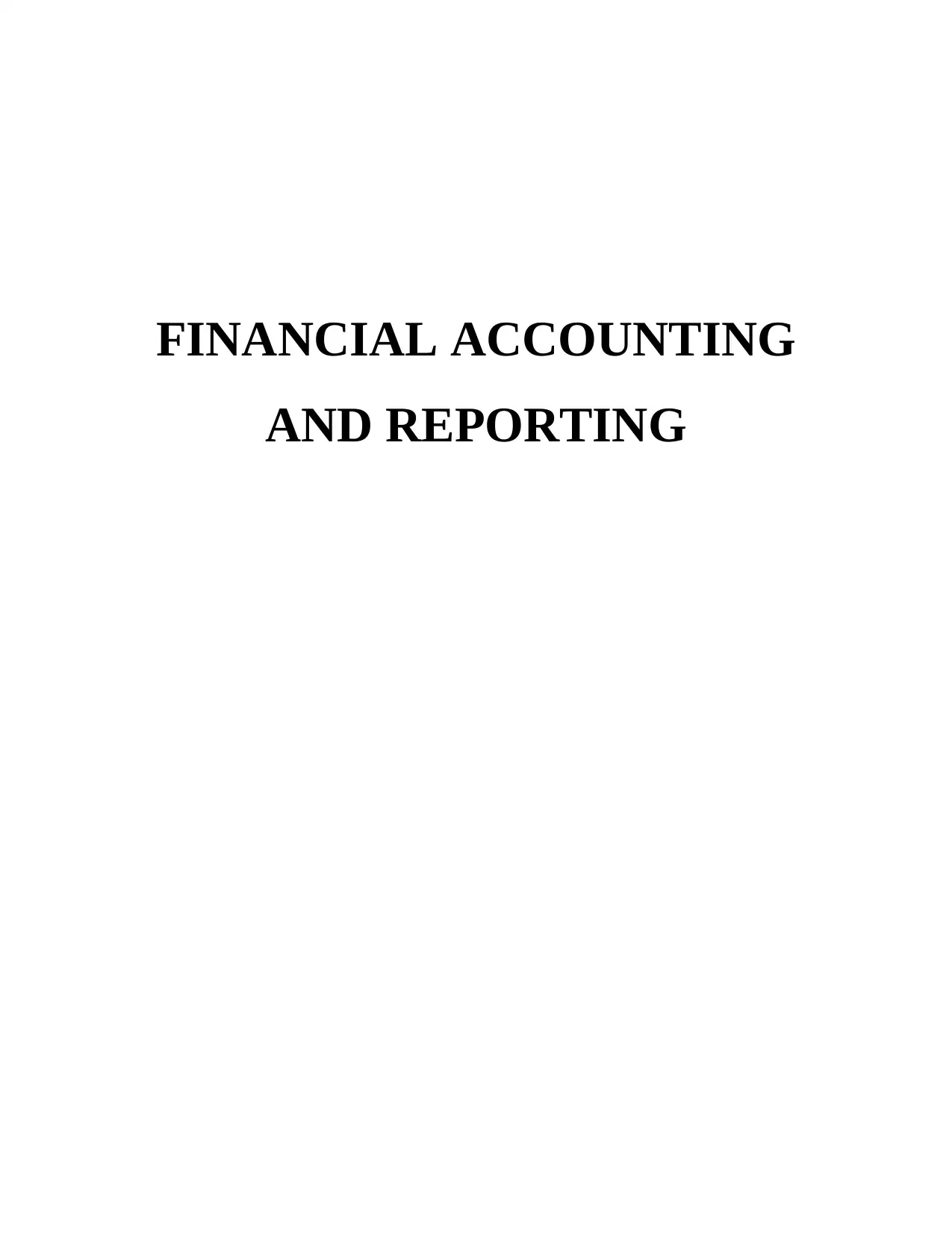
FINANCIAL ACCOUNTING
AND REPORTING
AND REPORTING
Paraphrase This Document
Need a fresh take? Get an instant paraphrase of this document with our AI Paraphraser
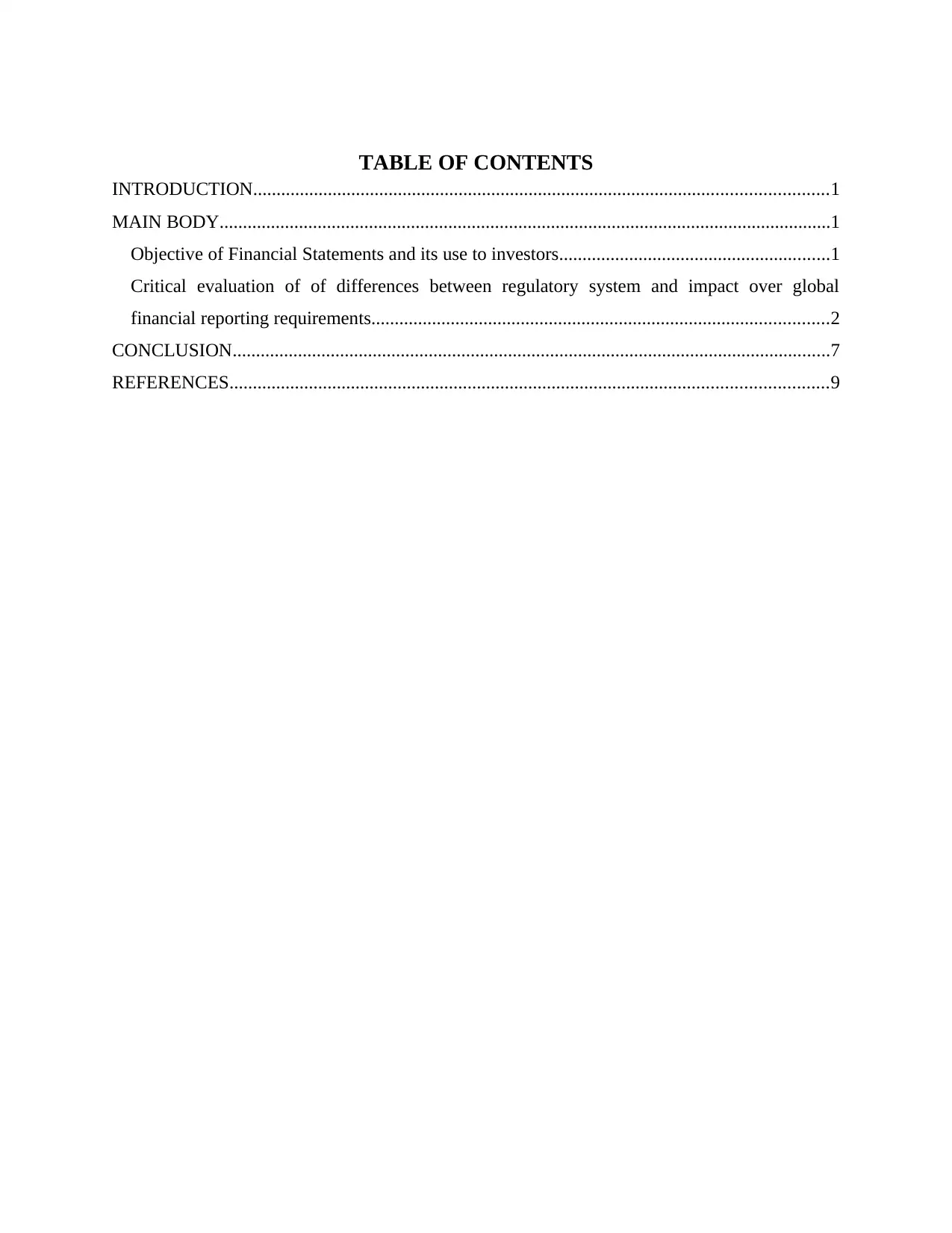
TABLE OF CONTENTS
INTRODUCTION...........................................................................................................................1
MAIN BODY...................................................................................................................................1
Objective of Financial Statements and its use to investors..........................................................1
Critical evaluation of of differences between regulatory system and impact over global
financial reporting requirements..................................................................................................2
CONCLUSION................................................................................................................................7
REFERENCES................................................................................................................................9
INTRODUCTION...........................................................................................................................1
MAIN BODY...................................................................................................................................1
Objective of Financial Statements and its use to investors..........................................................1
Critical evaluation of of differences between regulatory system and impact over global
financial reporting requirements..................................................................................................2
CONCLUSION................................................................................................................................7
REFERENCES................................................................................................................................9
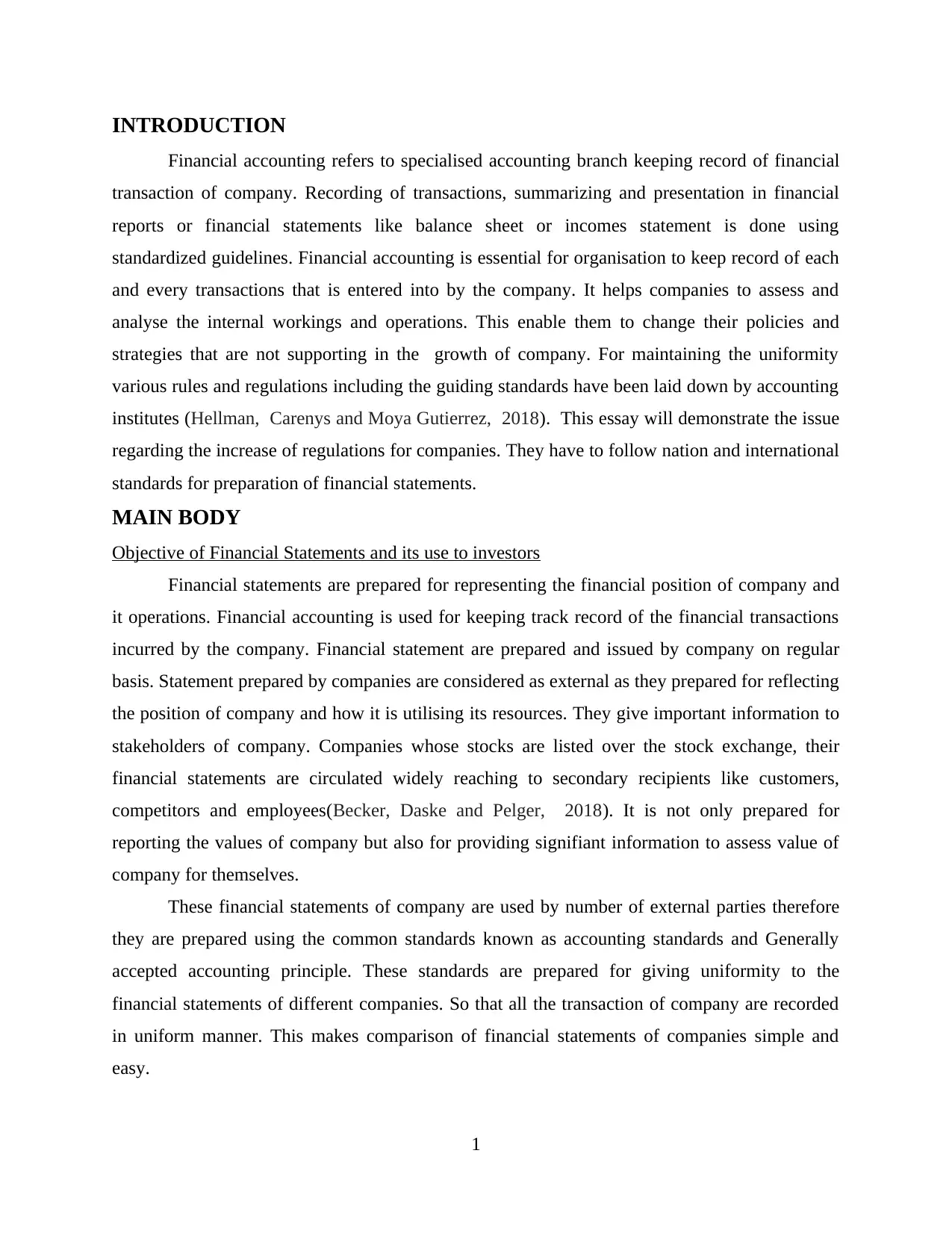
INTRODUCTION
Financial accounting refers to specialised accounting branch keeping record of financial
transaction of company. Recording of transactions, summarizing and presentation in financial
reports or financial statements like balance sheet or incomes statement is done using
standardized guidelines. Financial accounting is essential for organisation to keep record of each
and every transactions that is entered into by the company. It helps companies to assess and
analyse the internal workings and operations. This enable them to change their policies and
strategies that are not supporting in the growth of company. For maintaining the uniformity
various rules and regulations including the guiding standards have been laid down by accounting
institutes (Hellman, Carenys and Moya Gutierrez, 2018). This essay will demonstrate the issue
regarding the increase of regulations for companies. They have to follow nation and international
standards for preparation of financial statements.
MAIN BODY
Objective of Financial Statements and its use to investors
Financial statements are prepared for representing the financial position of company and
it operations. Financial accounting is used for keeping track record of the financial transactions
incurred by the company. Financial statement are prepared and issued by company on regular
basis. Statement prepared by companies are considered as external as they prepared for reflecting
the position of company and how it is utilising its resources. They give important information to
stakeholders of company. Companies whose stocks are listed over the stock exchange, their
financial statements are circulated widely reaching to secondary recipients like customers,
competitors and employees(Becker, Daske and Pelger, 2018). It is not only prepared for
reporting the values of company but also for providing signifiant information to assess value of
company for themselves.
These financial statements of company are used by number of external parties therefore
they are prepared using the common standards known as accounting standards and Generally
accepted accounting principle. These standards are prepared for giving uniformity to the
financial statements of different companies. So that all the transaction of company are recorded
in uniform manner. This makes comparison of financial statements of companies simple and
easy.
1
Financial accounting refers to specialised accounting branch keeping record of financial
transaction of company. Recording of transactions, summarizing and presentation in financial
reports or financial statements like balance sheet or incomes statement is done using
standardized guidelines. Financial accounting is essential for organisation to keep record of each
and every transactions that is entered into by the company. It helps companies to assess and
analyse the internal workings and operations. This enable them to change their policies and
strategies that are not supporting in the growth of company. For maintaining the uniformity
various rules and regulations including the guiding standards have been laid down by accounting
institutes (Hellman, Carenys and Moya Gutierrez, 2018). This essay will demonstrate the issue
regarding the increase of regulations for companies. They have to follow nation and international
standards for preparation of financial statements.
MAIN BODY
Objective of Financial Statements and its use to investors
Financial statements are prepared for representing the financial position of company and
it operations. Financial accounting is used for keeping track record of the financial transactions
incurred by the company. Financial statement are prepared and issued by company on regular
basis. Statement prepared by companies are considered as external as they prepared for reflecting
the position of company and how it is utilising its resources. They give important information to
stakeholders of company. Companies whose stocks are listed over the stock exchange, their
financial statements are circulated widely reaching to secondary recipients like customers,
competitors and employees(Becker, Daske and Pelger, 2018). It is not only prepared for
reporting the values of company but also for providing signifiant information to assess value of
company for themselves.
These financial statements of company are used by number of external parties therefore
they are prepared using the common standards known as accounting standards and Generally
accepted accounting principle. These standards are prepared for giving uniformity to the
financial statements of different companies. So that all the transaction of company are recorded
in uniform manner. This makes comparison of financial statements of companies simple and
easy.
1
⊘ This is a preview!⊘
Do you want full access?
Subscribe today to unlock all pages.

Trusted by 1+ million students worldwide
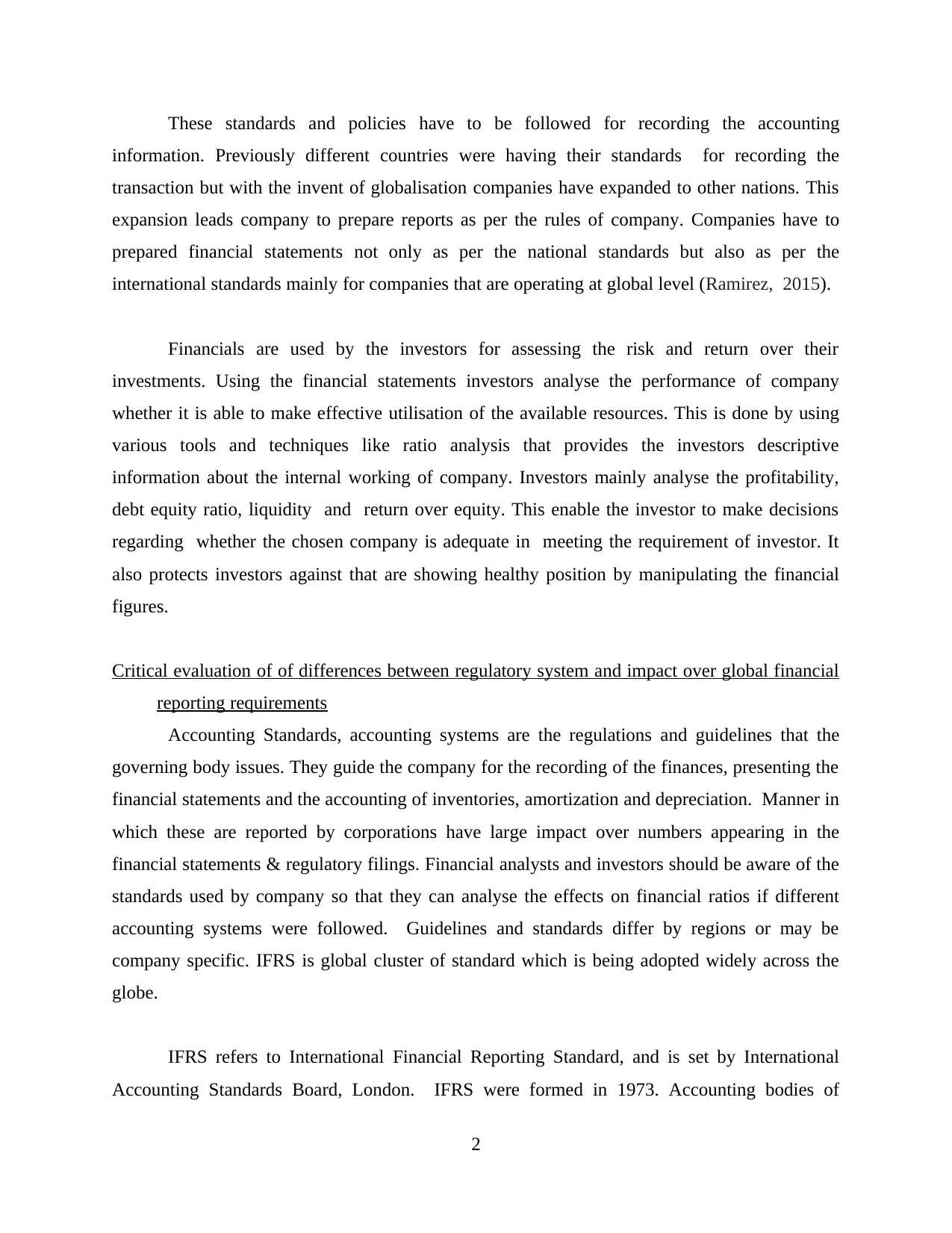
These standards and policies have to be followed for recording the accounting
information. Previously different countries were having their standards for recording the
transaction but with the invent of globalisation companies have expanded to other nations. This
expansion leads company to prepare reports as per the rules of company. Companies have to
prepared financial statements not only as per the national standards but also as per the
international standards mainly for companies that are operating at global level (Ramirez, 2015).
Financials are used by the investors for assessing the risk and return over their
investments. Using the financial statements investors analyse the performance of company
whether it is able to make effective utilisation of the available resources. This is done by using
various tools and techniques like ratio analysis that provides the investors descriptive
information about the internal working of company. Investors mainly analyse the profitability,
debt equity ratio, liquidity and return over equity. This enable the investor to make decisions
regarding whether the chosen company is adequate in meeting the requirement of investor. It
also protects investors against that are showing healthy position by manipulating the financial
figures.
Critical evaluation of of differences between regulatory system and impact over global financial
reporting requirements
Accounting Standards, accounting systems are the regulations and guidelines that the
governing body issues. They guide the company for the recording of the finances, presenting the
financial statements and the accounting of inventories, amortization and depreciation. Manner in
which these are reported by corporations have large impact over numbers appearing in the
financial statements & regulatory filings. Financial analysts and investors should be aware of the
standards used by company so that they can analyse the effects on financial ratios if different
accounting systems were followed. Guidelines and standards differ by regions or may be
company specific. IFRS is global cluster of standard which is being adopted widely across the
globe.
IFRS refers to International Financial Reporting Standard, and is set by International
Accounting Standards Board, London. IFRS were formed in 1973. Accounting bodies of
2
information. Previously different countries were having their standards for recording the
transaction but with the invent of globalisation companies have expanded to other nations. This
expansion leads company to prepare reports as per the rules of company. Companies have to
prepared financial statements not only as per the national standards but also as per the
international standards mainly for companies that are operating at global level (Ramirez, 2015).
Financials are used by the investors for assessing the risk and return over their
investments. Using the financial statements investors analyse the performance of company
whether it is able to make effective utilisation of the available resources. This is done by using
various tools and techniques like ratio analysis that provides the investors descriptive
information about the internal working of company. Investors mainly analyse the profitability,
debt equity ratio, liquidity and return over equity. This enable the investor to make decisions
regarding whether the chosen company is adequate in meeting the requirement of investor. It
also protects investors against that are showing healthy position by manipulating the financial
figures.
Critical evaluation of of differences between regulatory system and impact over global financial
reporting requirements
Accounting Standards, accounting systems are the regulations and guidelines that the
governing body issues. They guide the company for the recording of the finances, presenting the
financial statements and the accounting of inventories, amortization and depreciation. Manner in
which these are reported by corporations have large impact over numbers appearing in the
financial statements & regulatory filings. Financial analysts and investors should be aware of the
standards used by company so that they can analyse the effects on financial ratios if different
accounting systems were followed. Guidelines and standards differ by regions or may be
company specific. IFRS is global cluster of standard which is being adopted widely across the
globe.
IFRS refers to International Financial Reporting Standard, and is set by International
Accounting Standards Board, London. IFRS were formed in 1973. Accounting bodies of
2
Paraphrase This Document
Need a fresh take? Get an instant paraphrase of this document with our AI Paraphraser
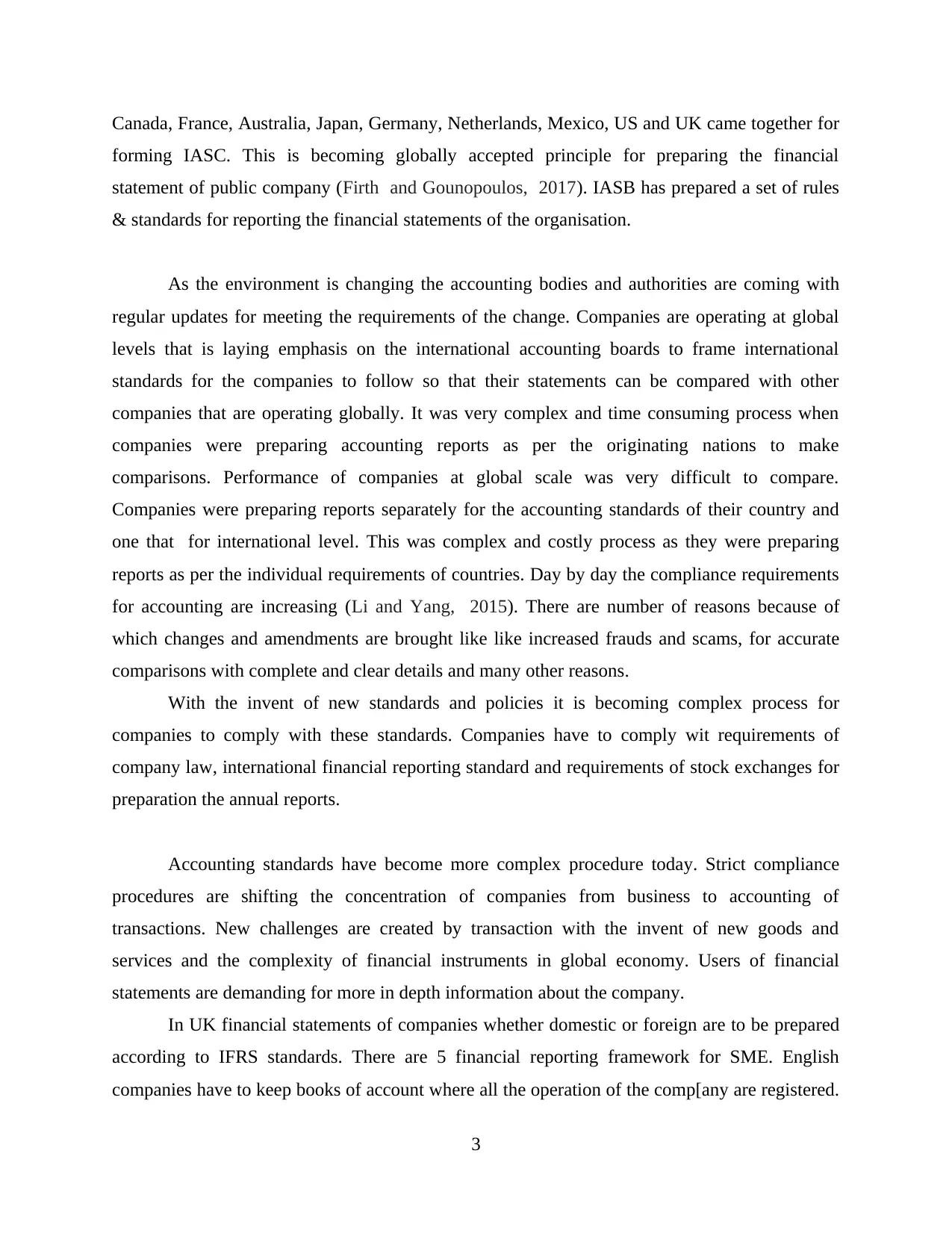
Canada, France, Australia, Japan, Germany, Netherlands, Mexico, US and UK came together for
forming IASC. This is becoming globally accepted principle for preparing the financial
statement of public company (Firth and Gounopoulos, 2017). IASB has prepared a set of rules
& standards for reporting the financial statements of the organisation.
As the environment is changing the accounting bodies and authorities are coming with
regular updates for meeting the requirements of the change. Companies are operating at global
levels that is laying emphasis on the international accounting boards to frame international
standards for the companies to follow so that their statements can be compared with other
companies that are operating globally. It was very complex and time consuming process when
companies were preparing accounting reports as per the originating nations to make
comparisons. Performance of companies at global scale was very difficult to compare.
Companies were preparing reports separately for the accounting standards of their country and
one that for international level. This was complex and costly process as they were preparing
reports as per the individual requirements of countries. Day by day the compliance requirements
for accounting are increasing (Li and Yang, 2015). There are number of reasons because of
which changes and amendments are brought like like increased frauds and scams, for accurate
comparisons with complete and clear details and many other reasons.
With the invent of new standards and policies it is becoming complex process for
companies to comply with these standards. Companies have to comply wit requirements of
company law, international financial reporting standard and requirements of stock exchanges for
preparation the annual reports.
Accounting standards have become more complex procedure today. Strict compliance
procedures are shifting the concentration of companies from business to accounting of
transactions. New challenges are created by transaction with the invent of new goods and
services and the complexity of financial instruments in global economy. Users of financial
statements are demanding for more in depth information about the company.
In UK financial statements of companies whether domestic or foreign are to be prepared
according to IFRS standards. There are 5 financial reporting framework for SME. English
companies have to keep books of account where all the operation of the comp[any are registered.
3
forming IASC. This is becoming globally accepted principle for preparing the financial
statement of public company (Firth and Gounopoulos, 2017). IASB has prepared a set of rules
& standards for reporting the financial statements of the organisation.
As the environment is changing the accounting bodies and authorities are coming with
regular updates for meeting the requirements of the change. Companies are operating at global
levels that is laying emphasis on the international accounting boards to frame international
standards for the companies to follow so that their statements can be compared with other
companies that are operating globally. It was very complex and time consuming process when
companies were preparing accounting reports as per the originating nations to make
comparisons. Performance of companies at global scale was very difficult to compare.
Companies were preparing reports separately for the accounting standards of their country and
one that for international level. This was complex and costly process as they were preparing
reports as per the individual requirements of countries. Day by day the compliance requirements
for accounting are increasing (Li and Yang, 2015). There are number of reasons because of
which changes and amendments are brought like like increased frauds and scams, for accurate
comparisons with complete and clear details and many other reasons.
With the invent of new standards and policies it is becoming complex process for
companies to comply with these standards. Companies have to comply wit requirements of
company law, international financial reporting standard and requirements of stock exchanges for
preparation the annual reports.
Accounting standards have become more complex procedure today. Strict compliance
procedures are shifting the concentration of companies from business to accounting of
transactions. New challenges are created by transaction with the invent of new goods and
services and the complexity of financial instruments in global economy. Users of financial
statements are demanding for more in depth information about the company.
In UK financial statements of companies whether domestic or foreign are to be prepared
according to IFRS standards. There are 5 financial reporting framework for SME. English
companies have to keep books of account where all the operation of the comp[any are registered.
3
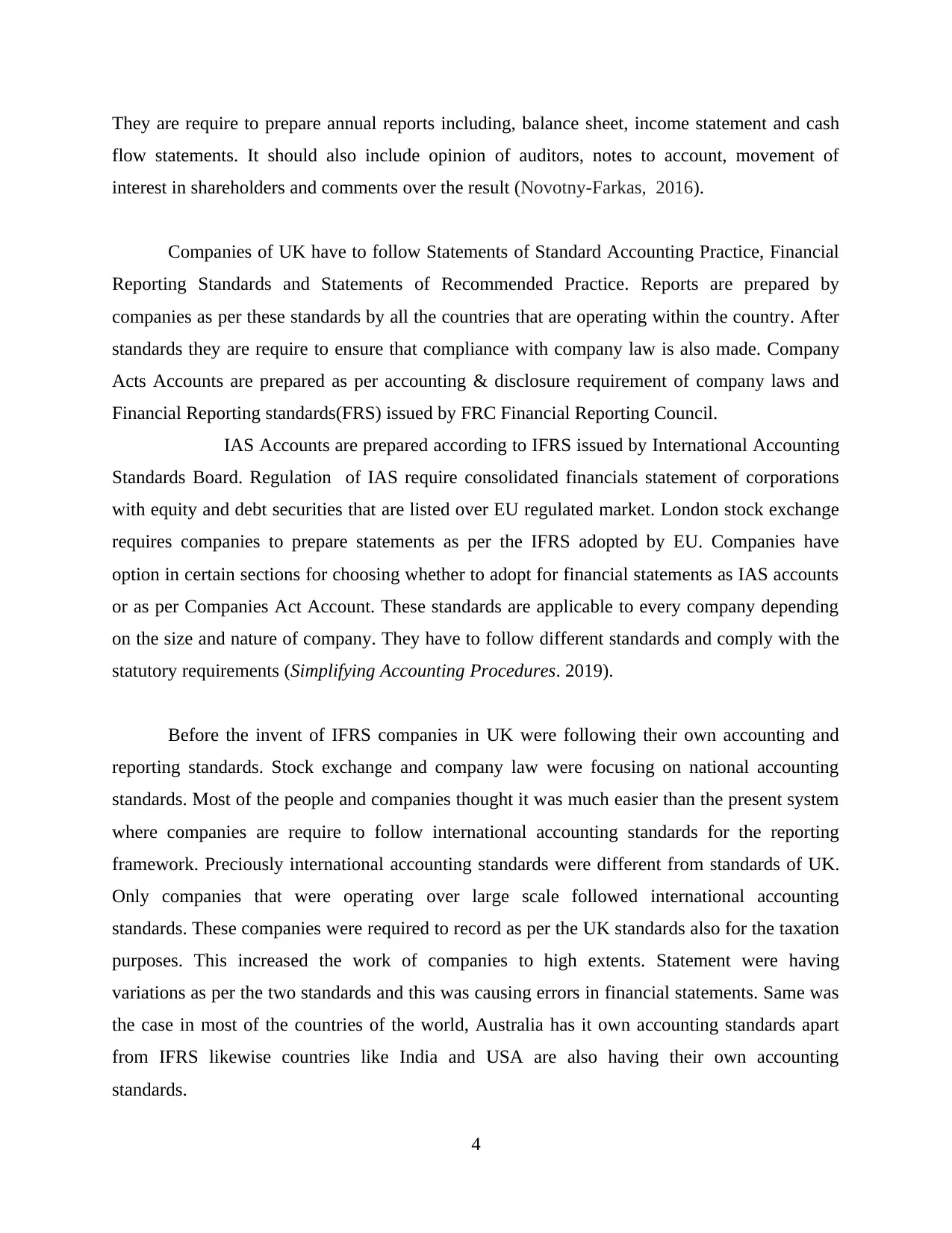
They are require to prepare annual reports including, balance sheet, income statement and cash
flow statements. It should also include opinion of auditors, notes to account, movement of
interest in shareholders and comments over the result (Novotny-Farkas, 2016).
Companies of UK have to follow Statements of Standard Accounting Practice, Financial
Reporting Standards and Statements of Recommended Practice. Reports are prepared by
companies as per these standards by all the countries that are operating within the country. After
standards they are require to ensure that compliance with company law is also made. Company
Acts Accounts are prepared as per accounting & disclosure requirement of company laws and
Financial Reporting standards(FRS) issued by FRC Financial Reporting Council.
IAS Accounts are prepared according to IFRS issued by International Accounting
Standards Board. Regulation of IAS require consolidated financials statement of corporations
with equity and debt securities that are listed over EU regulated market. London stock exchange
requires companies to prepare statements as per the IFRS adopted by EU. Companies have
option in certain sections for choosing whether to adopt for financial statements as IAS accounts
or as per Companies Act Account. These standards are applicable to every company depending
on the size and nature of company. They have to follow different standards and comply with the
statutory requirements (Simplifying Accounting Procedures. 2019).
Before the invent of IFRS companies in UK were following their own accounting and
reporting standards. Stock exchange and company law were focusing on national accounting
standards. Most of the people and companies thought it was much easier than the present system
where companies are require to follow international accounting standards for the reporting
framework. Preciously international accounting standards were different from standards of UK.
Only companies that were operating over large scale followed international accounting
standards. These companies were required to record as per the UK standards also for the taxation
purposes. This increased the work of companies to high extents. Statement were having
variations as per the two standards and this was causing errors in financial statements. Same was
the case in most of the countries of the world, Australia has it own accounting standards apart
from IFRS likewise countries like India and USA are also having their own accounting
standards.
4
flow statements. It should also include opinion of auditors, notes to account, movement of
interest in shareholders and comments over the result (Novotny-Farkas, 2016).
Companies of UK have to follow Statements of Standard Accounting Practice, Financial
Reporting Standards and Statements of Recommended Practice. Reports are prepared by
companies as per these standards by all the countries that are operating within the country. After
standards they are require to ensure that compliance with company law is also made. Company
Acts Accounts are prepared as per accounting & disclosure requirement of company laws and
Financial Reporting standards(FRS) issued by FRC Financial Reporting Council.
IAS Accounts are prepared according to IFRS issued by International Accounting
Standards Board. Regulation of IAS require consolidated financials statement of corporations
with equity and debt securities that are listed over EU regulated market. London stock exchange
requires companies to prepare statements as per the IFRS adopted by EU. Companies have
option in certain sections for choosing whether to adopt for financial statements as IAS accounts
or as per Companies Act Account. These standards are applicable to every company depending
on the size and nature of company. They have to follow different standards and comply with the
statutory requirements (Simplifying Accounting Procedures. 2019).
Before the invent of IFRS companies in UK were following their own accounting and
reporting standards. Stock exchange and company law were focusing on national accounting
standards. Most of the people and companies thought it was much easier than the present system
where companies are require to follow international accounting standards for the reporting
framework. Preciously international accounting standards were different from standards of UK.
Only companies that were operating over large scale followed international accounting
standards. These companies were required to record as per the UK standards also for the taxation
purposes. This increased the work of companies to high extents. Statement were having
variations as per the two standards and this was causing errors in financial statements. Same was
the case in most of the countries of the world, Australia has it own accounting standards apart
from IFRS likewise countries like India and USA are also having their own accounting
standards.
4
⊘ This is a preview!⊘
Do you want full access?
Subscribe today to unlock all pages.

Trusted by 1+ million students worldwide
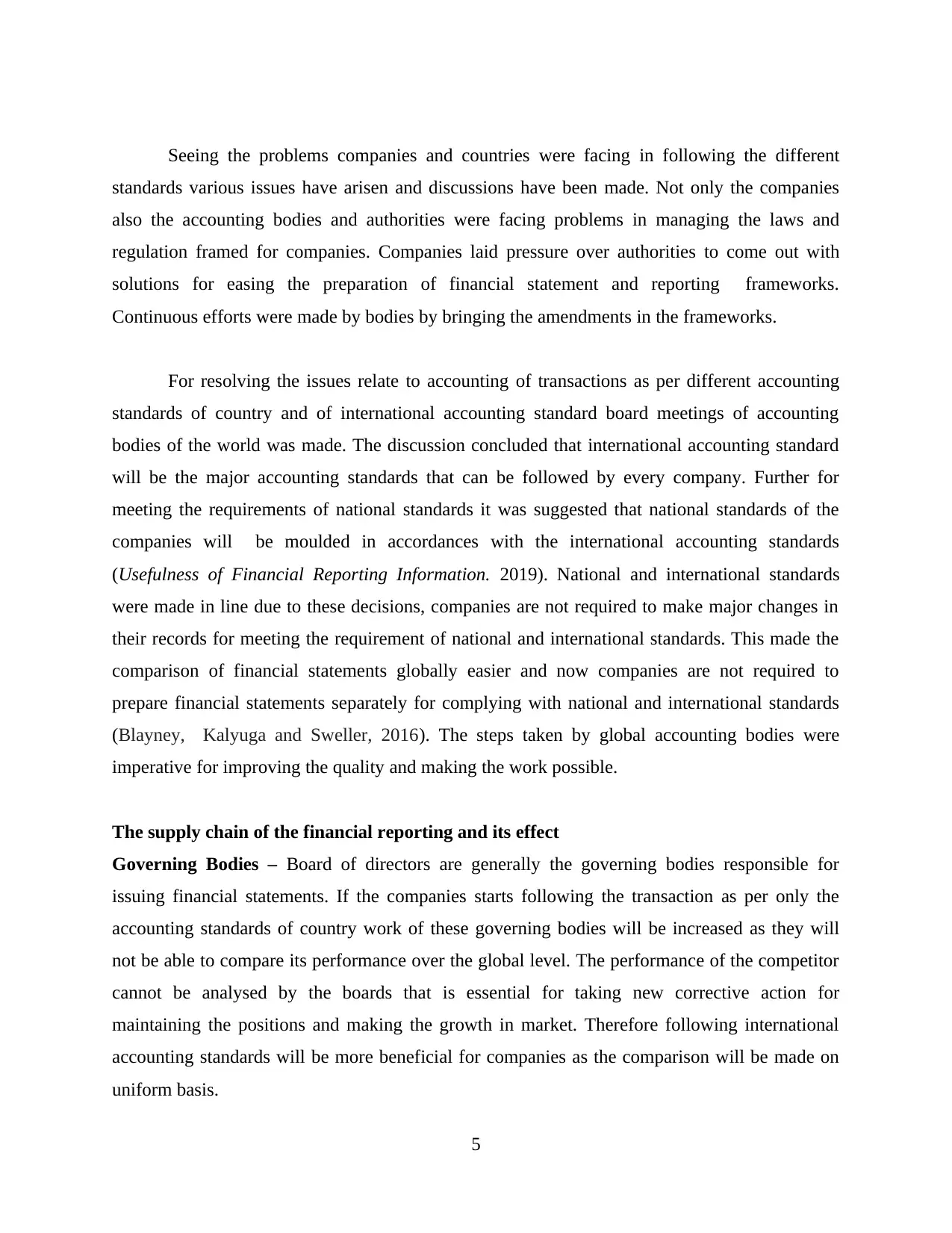
Seeing the problems companies and countries were facing in following the different
standards various issues have arisen and discussions have been made. Not only the companies
also the accounting bodies and authorities were facing problems in managing the laws and
regulation framed for companies. Companies laid pressure over authorities to come out with
solutions for easing the preparation of financial statement and reporting frameworks.
Continuous efforts were made by bodies by bringing the amendments in the frameworks.
For resolving the issues relate to accounting of transactions as per different accounting
standards of country and of international accounting standard board meetings of accounting
bodies of the world was made. The discussion concluded that international accounting standard
will be the major accounting standards that can be followed by every company. Further for
meeting the requirements of national standards it was suggested that national standards of the
companies will be moulded in accordances with the international accounting standards
(Usefulness of Financial Reporting Information. 2019). National and international standards
were made in line due to these decisions, companies are not required to make major changes in
their records for meeting the requirement of national and international standards. This made the
comparison of financial statements globally easier and now companies are not required to
prepare financial statements separately for complying with national and international standards
(Blayney, Kalyuga and Sweller, 2016). The steps taken by global accounting bodies were
imperative for improving the quality and making the work possible.
The supply chain of the financial reporting and its effect
Governing Bodies – Board of directors are generally the governing bodies responsible for
issuing financial statements. If the companies starts following the transaction as per only the
accounting standards of country work of these governing bodies will be increased as they will
not be able to compare its performance over the global level. The performance of the competitor
cannot be analysed by the boards that is essential for taking new corrective action for
maintaining the positions and making the growth in market. Therefore following international
accounting standards will be more beneficial for companies as the comparison will be made on
uniform basis.
5
standards various issues have arisen and discussions have been made. Not only the companies
also the accounting bodies and authorities were facing problems in managing the laws and
regulation framed for companies. Companies laid pressure over authorities to come out with
solutions for easing the preparation of financial statement and reporting frameworks.
Continuous efforts were made by bodies by bringing the amendments in the frameworks.
For resolving the issues relate to accounting of transactions as per different accounting
standards of country and of international accounting standard board meetings of accounting
bodies of the world was made. The discussion concluded that international accounting standard
will be the major accounting standards that can be followed by every company. Further for
meeting the requirements of national standards it was suggested that national standards of the
companies will be moulded in accordances with the international accounting standards
(Usefulness of Financial Reporting Information. 2019). National and international standards
were made in line due to these decisions, companies are not required to make major changes in
their records for meeting the requirement of national and international standards. This made the
comparison of financial statements globally easier and now companies are not required to
prepare financial statements separately for complying with national and international standards
(Blayney, Kalyuga and Sweller, 2016). The steps taken by global accounting bodies were
imperative for improving the quality and making the work possible.
The supply chain of the financial reporting and its effect
Governing Bodies – Board of directors are generally the governing bodies responsible for
issuing financial statements. If the companies starts following the transaction as per only the
accounting standards of country work of these governing bodies will be increased as they will
not be able to compare its performance over the global level. The performance of the competitor
cannot be analysed by the boards that is essential for taking new corrective action for
maintaining the positions and making the growth in market. Therefore following international
accounting standards will be more beneficial for companies as the comparison will be made on
uniform basis.
5
Paraphrase This Document
Need a fresh take? Get an instant paraphrase of this document with our AI Paraphraser
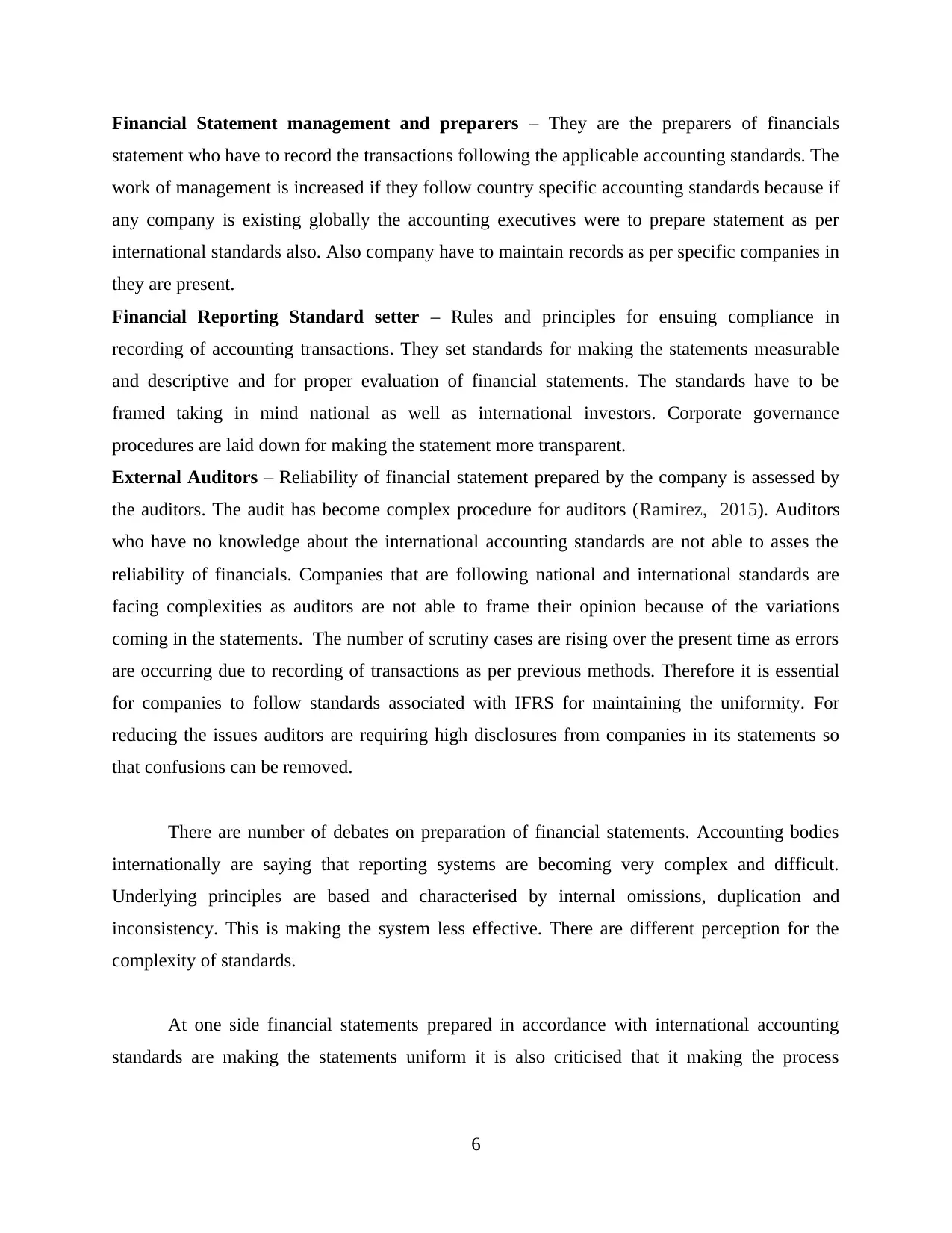
Financial Statement management and preparers – They are the preparers of financials
statement who have to record the transactions following the applicable accounting standards. The
work of management is increased if they follow country specific accounting standards because if
any company is existing globally the accounting executives were to prepare statement as per
international standards also. Also company have to maintain records as per specific companies in
they are present.
Financial Reporting Standard setter – Rules and principles for ensuing compliance in
recording of accounting transactions. They set standards for making the statements measurable
and descriptive and for proper evaluation of financial statements. The standards have to be
framed taking in mind national as well as international investors. Corporate governance
procedures are laid down for making the statement more transparent.
External Auditors – Reliability of financial statement prepared by the company is assessed by
the auditors. The audit has become complex procedure for auditors (Ramirez, 2015). Auditors
who have no knowledge about the international accounting standards are not able to asses the
reliability of financials. Companies that are following national and international standards are
facing complexities as auditors are not able to frame their opinion because of the variations
coming in the statements. The number of scrutiny cases are rising over the present time as errors
are occurring due to recording of transactions as per previous methods. Therefore it is essential
for companies to follow standards associated with IFRS for maintaining the uniformity. For
reducing the issues auditors are requiring high disclosures from companies in its statements so
that confusions can be removed.
There are number of debates on preparation of financial statements. Accounting bodies
internationally are saying that reporting systems are becoming very complex and difficult.
Underlying principles are based and characterised by internal omissions, duplication and
inconsistency. This is making the system less effective. There are different perception for the
complexity of standards.
At one side financial statements prepared in accordance with international accounting
standards are making the statements uniform it is also criticised that it making the process
6
statement who have to record the transactions following the applicable accounting standards. The
work of management is increased if they follow country specific accounting standards because if
any company is existing globally the accounting executives were to prepare statement as per
international standards also. Also company have to maintain records as per specific companies in
they are present.
Financial Reporting Standard setter – Rules and principles for ensuing compliance in
recording of accounting transactions. They set standards for making the statements measurable
and descriptive and for proper evaluation of financial statements. The standards have to be
framed taking in mind national as well as international investors. Corporate governance
procedures are laid down for making the statement more transparent.
External Auditors – Reliability of financial statement prepared by the company is assessed by
the auditors. The audit has become complex procedure for auditors (Ramirez, 2015). Auditors
who have no knowledge about the international accounting standards are not able to asses the
reliability of financials. Companies that are following national and international standards are
facing complexities as auditors are not able to frame their opinion because of the variations
coming in the statements. The number of scrutiny cases are rising over the present time as errors
are occurring due to recording of transactions as per previous methods. Therefore it is essential
for companies to follow standards associated with IFRS for maintaining the uniformity. For
reducing the issues auditors are requiring high disclosures from companies in its statements so
that confusions can be removed.
There are number of debates on preparation of financial statements. Accounting bodies
internationally are saying that reporting systems are becoming very complex and difficult.
Underlying principles are based and characterised by internal omissions, duplication and
inconsistency. This is making the system less effective. There are different perception for the
complexity of standards.
At one side financial statements prepared in accordance with international accounting
standards are making the statements uniform it is also criticised that it making the process
6
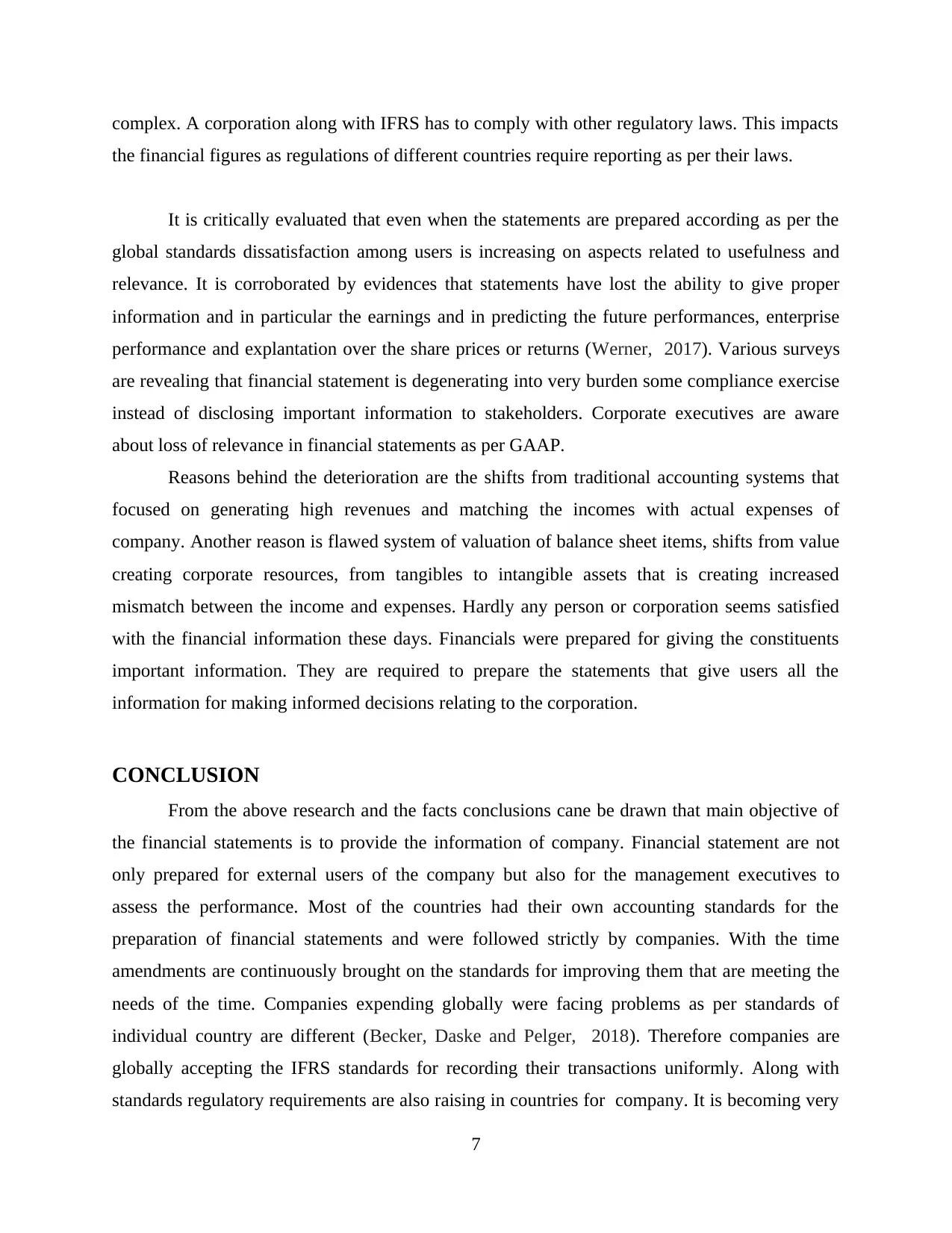
complex. A corporation along with IFRS has to comply with other regulatory laws. This impacts
the financial figures as regulations of different countries require reporting as per their laws.
It is critically evaluated that even when the statements are prepared according as per the
global standards dissatisfaction among users is increasing on aspects related to usefulness and
relevance. It is corroborated by evidences that statements have lost the ability to give proper
information and in particular the earnings and in predicting the future performances, enterprise
performance and explantation over the share prices or returns (Werner, 2017). Various surveys
are revealing that financial statement is degenerating into very burden some compliance exercise
instead of disclosing important information to stakeholders. Corporate executives are aware
about loss of relevance in financial statements as per GAAP.
Reasons behind the deterioration are the shifts from traditional accounting systems that
focused on generating high revenues and matching the incomes with actual expenses of
company. Another reason is flawed system of valuation of balance sheet items, shifts from value
creating corporate resources, from tangibles to intangible assets that is creating increased
mismatch between the income and expenses. Hardly any person or corporation seems satisfied
with the financial information these days. Financials were prepared for giving the constituents
important information. They are required to prepare the statements that give users all the
information for making informed decisions relating to the corporation.
CONCLUSION
From the above research and the facts conclusions cane be drawn that main objective of
the financial statements is to provide the information of company. Financial statement are not
only prepared for external users of the company but also for the management executives to
assess the performance. Most of the countries had their own accounting standards for the
preparation of financial statements and were followed strictly by companies. With the time
amendments are continuously brought on the standards for improving them that are meeting the
needs of the time. Companies expending globally were facing problems as per standards of
individual country are different (Becker, Daske and Pelger, 2018). Therefore companies are
globally accepting the IFRS standards for recording their transactions uniformly. Along with
standards regulatory requirements are also raising in countries for company. It is becoming very
7
the financial figures as regulations of different countries require reporting as per their laws.
It is critically evaluated that even when the statements are prepared according as per the
global standards dissatisfaction among users is increasing on aspects related to usefulness and
relevance. It is corroborated by evidences that statements have lost the ability to give proper
information and in particular the earnings and in predicting the future performances, enterprise
performance and explantation over the share prices or returns (Werner, 2017). Various surveys
are revealing that financial statement is degenerating into very burden some compliance exercise
instead of disclosing important information to stakeholders. Corporate executives are aware
about loss of relevance in financial statements as per GAAP.
Reasons behind the deterioration are the shifts from traditional accounting systems that
focused on generating high revenues and matching the incomes with actual expenses of
company. Another reason is flawed system of valuation of balance sheet items, shifts from value
creating corporate resources, from tangibles to intangible assets that is creating increased
mismatch between the income and expenses. Hardly any person or corporation seems satisfied
with the financial information these days. Financials were prepared for giving the constituents
important information. They are required to prepare the statements that give users all the
information for making informed decisions relating to the corporation.
CONCLUSION
From the above research and the facts conclusions cane be drawn that main objective of
the financial statements is to provide the information of company. Financial statement are not
only prepared for external users of the company but also for the management executives to
assess the performance. Most of the countries had their own accounting standards for the
preparation of financial statements and were followed strictly by companies. With the time
amendments are continuously brought on the standards for improving them that are meeting the
needs of the time. Companies expending globally were facing problems as per standards of
individual country are different (Becker, Daske and Pelger, 2018). Therefore companies are
globally accepting the IFRS standards for recording their transactions uniformly. Along with
standards regulatory requirements are also raising in countries for company. It is becoming very
7
⊘ This is a preview!⊘
Do you want full access?
Subscribe today to unlock all pages.

Trusted by 1+ million students worldwide
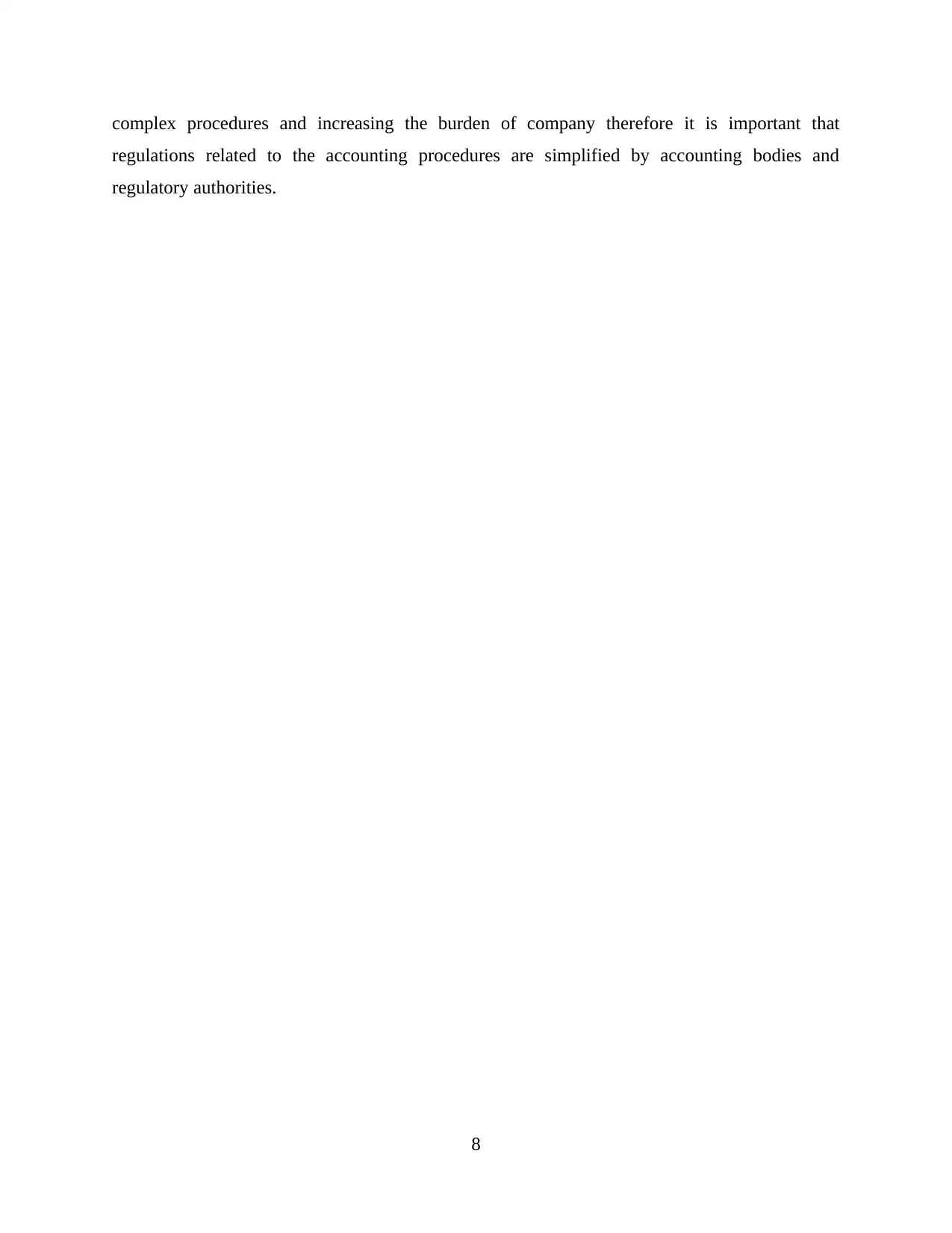
complex procedures and increasing the burden of company therefore it is important that
regulations related to the accounting procedures are simplified by accounting bodies and
regulatory authorities.
8
regulations related to the accounting procedures are simplified by accounting bodies and
regulatory authorities.
8
Paraphrase This Document
Need a fresh take? Get an instant paraphrase of this document with our AI Paraphraser
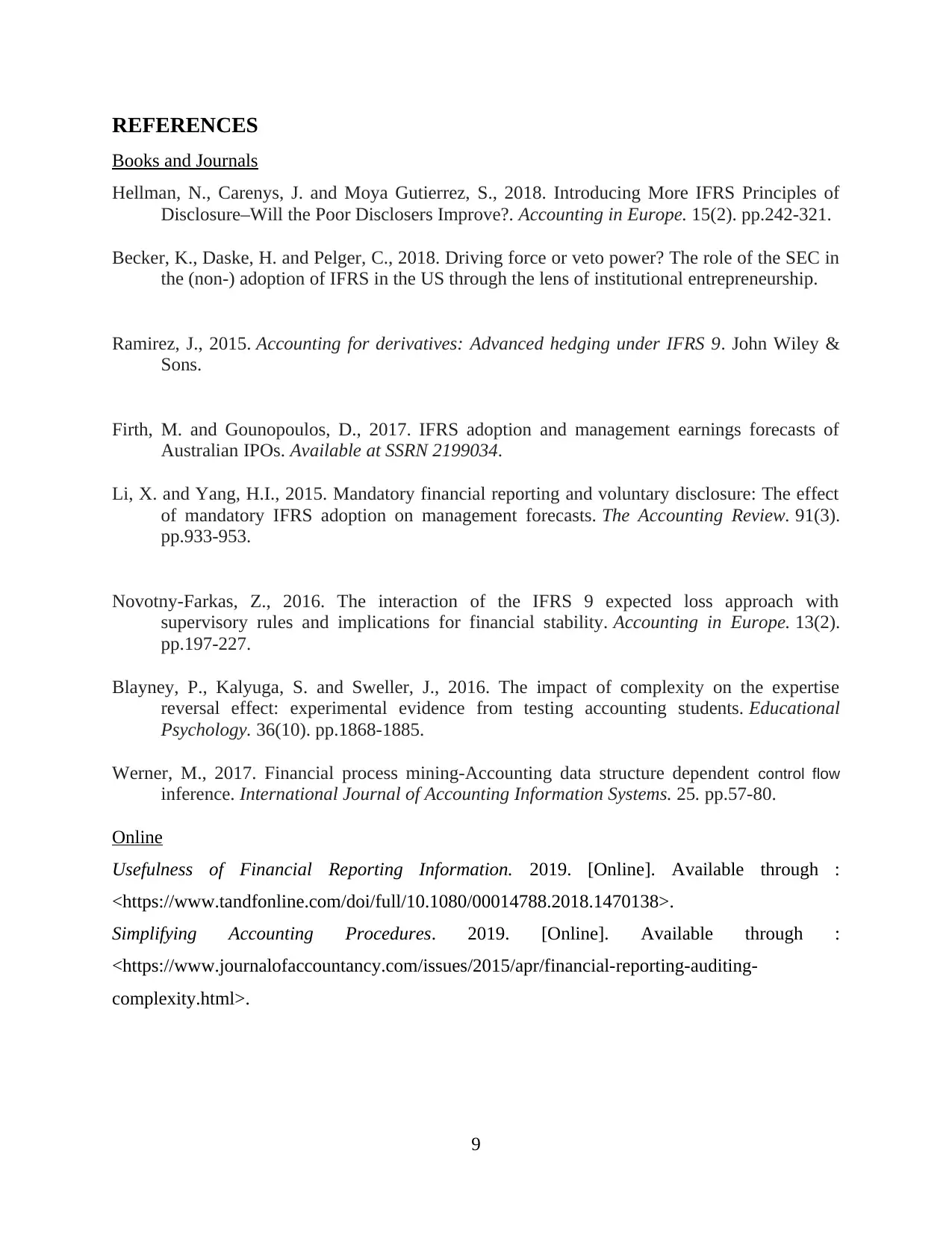
REFERENCES
Books and Journals
Hellman, N., Carenys, J. and Moya Gutierrez, S., 2018. Introducing More IFRS Principles of
Disclosure–Will the Poor Disclosers Improve?. Accounting in Europe. 15(2). pp.242-321.
Becker, K., Daske, H. and Pelger, C., 2018. Driving force or veto power? The role of the SEC in
the (non-) adoption of IFRS in the US through the lens of institutional entrepreneurship.
Ramirez, J., 2015. Accounting for derivatives: Advanced hedging under IFRS 9. John Wiley &
Sons.
Firth, M. and Gounopoulos, D., 2017. IFRS adoption and management earnings forecasts of
Australian IPOs. Available at SSRN 2199034.
Li, X. and Yang, H.I., 2015. Mandatory financial reporting and voluntary disclosure: The effect
of mandatory IFRS adoption on management forecasts. The Accounting Review. 91(3).
pp.933-953.
Novotny-Farkas, Z., 2016. The interaction of the IFRS 9 expected loss approach with
supervisory rules and implications for financial stability. Accounting in Europe. 13(2).
pp.197-227.
Blayney, P., Kalyuga, S. and Sweller, J., 2016. The impact of complexity on the expertise
reversal effect: experimental evidence from testing accounting students. Educational
Psychology. 36(10). pp.1868-1885.
Werner, M., 2017. Financial process mining-Accounting data structure dependent control flow
inference. International Journal of Accounting Information Systems. 25. pp.57-80.
Online
Usefulness of Financial Reporting Information. 2019. [Online]. Available through :
<https://www.tandfonline.com/doi/full/10.1080/00014788.2018.1470138>.
Simplifying Accounting Procedures. 2019. [Online]. Available through :
<https://www.journalofaccountancy.com/issues/2015/apr/financial-reporting-auditing-
complexity.html>.
9
Books and Journals
Hellman, N., Carenys, J. and Moya Gutierrez, S., 2018. Introducing More IFRS Principles of
Disclosure–Will the Poor Disclosers Improve?. Accounting in Europe. 15(2). pp.242-321.
Becker, K., Daske, H. and Pelger, C., 2018. Driving force or veto power? The role of the SEC in
the (non-) adoption of IFRS in the US through the lens of institutional entrepreneurship.
Ramirez, J., 2015. Accounting for derivatives: Advanced hedging under IFRS 9. John Wiley &
Sons.
Firth, M. and Gounopoulos, D., 2017. IFRS adoption and management earnings forecasts of
Australian IPOs. Available at SSRN 2199034.
Li, X. and Yang, H.I., 2015. Mandatory financial reporting and voluntary disclosure: The effect
of mandatory IFRS adoption on management forecasts. The Accounting Review. 91(3).
pp.933-953.
Novotny-Farkas, Z., 2016. The interaction of the IFRS 9 expected loss approach with
supervisory rules and implications for financial stability. Accounting in Europe. 13(2).
pp.197-227.
Blayney, P., Kalyuga, S. and Sweller, J., 2016. The impact of complexity on the expertise
reversal effect: experimental evidence from testing accounting students. Educational
Psychology. 36(10). pp.1868-1885.
Werner, M., 2017. Financial process mining-Accounting data structure dependent control flow
inference. International Journal of Accounting Information Systems. 25. pp.57-80.
Online
Usefulness of Financial Reporting Information. 2019. [Online]. Available through :
<https://www.tandfonline.com/doi/full/10.1080/00014788.2018.1470138>.
Simplifying Accounting Procedures. 2019. [Online]. Available through :
<https://www.journalofaccountancy.com/issues/2015/apr/financial-reporting-auditing-
complexity.html>.
9
1 out of 11
Related Documents
Your All-in-One AI-Powered Toolkit for Academic Success.
+13062052269
info@desklib.com
Available 24*7 on WhatsApp / Email
![[object Object]](/_next/static/media/star-bottom.7253800d.svg)
Unlock your academic potential
Copyright © 2020–2026 A2Z Services. All Rights Reserved. Developed and managed by ZUCOL.





